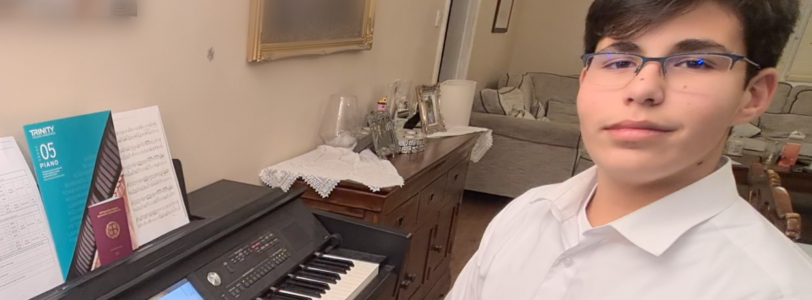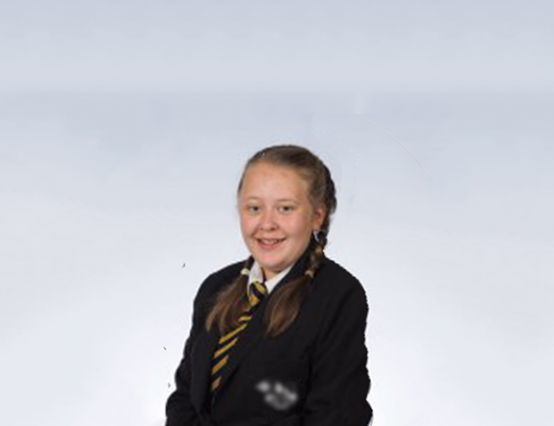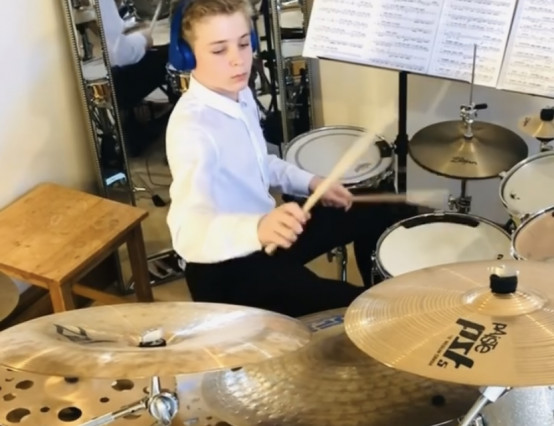13-year-old Anastasios completed his Piano Grade 5 with distinction and took his exam with a private music teacher. Anatasios made great progress in exploring progressively more complex elements of music, from time signatures to articulation, and has developed a visual, verbal and logical insight to music through his work on his music grade. He participates in several school projects, community activities and artistic competitions.
Maria Athanasiou, Anastasios's private music teacher, nominated him for TrinityTalent saying: "He has managed to develop his performative expression to a very good standard, especially on stylistic grounds. Having made decisive strides towards a well-rounded musicianship, his analytical, aural, stylistic and performative skills have improved remarkably over the last year, and his parents notice a very welcoming growth into his personal abilities and wider life skills too."
The Trinity panel said: "Anastasios shows clarity and rhythmical talent in his performance. He's progressing technically and we really appreciate how he's developing his charisma in his playing.”
How do you feel about being selected to be part of TrinityTalent Class of 2021 and being recognised in this way?
I feel very excited as well as honoured to be selected as part of the TrinityTalent Class of 2021. This is the best way to top up a very successful and fulfilling year for me, in regards to my music studies and development. I feel it is an amazing achievement and honour, given the other thousands of talented students out there, who have also decided to make music an active part of their lives. Personally, I find studying music very fulfilling. It is something I have enjoyed enormously for the past seven years. Studying the Trinity syllabus has allowed me to develop my skill as a classical pianist and has given me access to a wide choice of styles and material, ranging from world renowned classical pieces to Latin tangos, to waltzes, as well as to modern popular music, just to name a few.
How do you feel you have developed creatively and artistically in 2021?
In 2021 I achieved my Grade 5 in Classical Piano Performance. This was a milestone for me, as I progressed through my musical studies, and I was thrilled to achieve a distinction level grade for the fourth time in a row. I have found the level of material studied to require more focus, patience and dedication in order to reach mastery of execution. Overall, in 2021 I had to focus more on the sentiment and expression of the pieces, bringing out more feeling in my performance, rather than concentrating only on the basics of rhythm and tone. I became immersed in several different styles and have especially enjoyed the passion of Burgmüler’s Berceuse, the joyful feeling of the playful Amy Beache’s Pantalon and the sweet sorrow from the melody of Tchaikovsky’s Sweet Reverie.
What impact did your Trinity qualification have on your artistic development?
My Grade 5 is a milestone in my musical education and development. Achieving a distinction grade in this qualification feels like the dedication, effort, and attention to detail I have put into mastering the execution of my performance has paid off. I have just started working on pieces that allow me to explore my expression and externalise my feelings from listening to a specific piece of music. As I am generally very reserved in showing my personal emotions, I find studying this material has made me more capable of expressing sentiment through my playing, at least more than I was before. This makes a great difference in a performance and the execution of a piece, and as a result my personal style has matured further.
Has taking part in a Trinity qualification helped you to develop wider skills, such as communication skills, creativity or confidence?
My musical studies overall has allowed me to access a world that is mostly passively experienced by most people. I have been able not only to learn how to read and play scores of music, but also to identify patterns in music I listen to in my everyday life. I find myself repeatedly analysing the music I hear in terms of tone and rhythm, as well as dynamics, expression, and emotion. Playing music is another way of expressing oneself and communicating emotions to others. Just a few notes in a well-expressed phrase can be so powerful, in not only revealing the composer’s emotion, but actively making others feel the same emotions, without having spoken a single word. This is the power that music has.
I feel very lucky and privileged to be given the opportunity to develop my musical performance skills, as this gives me yet another way to interact with others. I also feel I have learned to find tricks and techniques that help me internalise the material as a learner and has certainly assisted me in learning to be more focused, patient and results-driven. I have learned to self-evaluate my performance, and have started recording my sessions, to analyse and identify areas of improvement. Overall, studying music has improved my study skills and made me more of an independent learner, as well as giving me new communication tools, replacing syntax and grammar with notes, metre and rhythm, and words with melodies and emotions.
If you took a digital music exam, please tell us how you found the experience of recording your performance
Taking the Trinity digital music exams has introduced me to the complexities of recording a performance. I had to consider camera placement and angles, lens aspect ratios, background lighting and noise, sound recording quality, etc. Additional considerations I had to look at were video and sound compression rates and their trade off to the quality of the recording versus the file size. Overall, I found the online guidance notes and instructional videos by Trinity’s instructors an invaluable tool that aided me to navigate through this setup in a comprehensive and easy way.
I have now started looking at alternative means of capturing my performances, e.g. by using midi connections and relevant computer software. This is something I wish to explore further in 2022, as digitising my music will help me develop a digital portfolio, as well as start building my own compositions and musical libraries.
What are the next steps for you artistically and creatively in 2022?
I am planning on taking my Grade 5 Music Theory, as well as my Grade 6 Classical Piano Performance. I am working on my music theory studies at present and have started on the Grade 6 syllabus. This year I want to explore more classical performance pieces and not only focus on the Trinity grade exams, in an effort to develop my dynamics and expression further.
What are your longer term aims, for example, for your future studies or work?
Longer term, I hope my school studies, GCSEs and later on my A-levels will allow me to continue my piano lessons, as I have thoroughly enjoyed these so far. I want music to be an option for further academic studies, but am also very keen to study sciences and mathematics, which are subjects I currently thoroughly enjoy. Irrespective of which direction I choose academically and professionally, I know music will always be a great part of my life and I will always seek to develop further as a musician. I aspire to be able to teach others in the future, as a means to be able to give back to the community all the experiences and enjoyment I am getting so far as a music student. I also hope I have the opportunity and experience to play with other musicians in a group, at some point soon in the near future. I also dream to be able, if at all possible, to play in a full symphonic orchestra later on, if I ever manage to reach that level.
Have you got any advice for other young people working towards a Trinity qualification?
I know sometimes practising to achieve a qualification can become repetitive, tiring and tedious. The way I managed to discipline myself was by setting a steady schedule and a no compromise work ethic. Make time to practice every day for at least 45 minutes, and if you miss a day make the time up in the next few days, or even at the weekend. Practice immediately after school, or between lessons. Although studying to play music requires great focus and mental capacity, it is very different from studying other subjects. The diversity of activity will allow you to take a good break from your other subjects, especially if you enjoy your art form.
Review your performances and repeat them if you find mistakes or imperfections. But always remember to have fun. I frequently take days where I only practice my scales and arpeggios, and then try to compose my own pieces or even reproduce a piece I heard on TV, online, or on the radio. So I never run out of tunes to try. Trying to play songs you enjoy listening to is very rewarding, and can break up your routine. But you need to keep the discipline and do the work too.
Is there anything creative you’re currently working on you’d like to tell us about?
I started on a composition of my own about two years ago, which I am still working on, but found my level at the time was limiting me in progressing further. I have not abandoned this though, as it is an amazingly melodic and nostalgic intro in a minor scale. I wish to study more harmony and composition before making a further informed attempt at completing it, but I am not abandoning that piece yet. I am just pausing it for the moment until I am more prepared. Overall, I want to start a digital recording library so I can make a portfolio of pieces. I am also considering creating my own YouTube channel where I can upload my work and receive, hopefully, constructive feedback from the wider community, as I feel this will greatly enhance my learning and development.
Read more about the talented young people selected to be featured as part of the TrinityTalent Class of 2021.









0 Comments